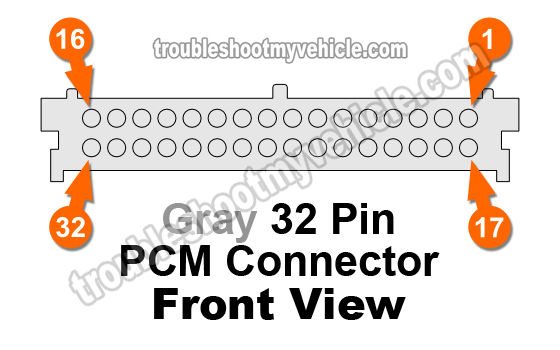Page 3 of 4
PCM Connector: Grey (C3) 1998-99

This section contains the C3 (Grey -Clear-) PCM connector pin outs. To navigate to a different PCM connector, use the links below:
| C3 (Grey -Clear-) PCM 32 Pin Connector | ||
|---|---|---|
| Pin | Wire Color | Description |
| 1 | Dark Green w/ White stripe | A/C Compressor Clutch Relay Control |
| 2 | Dark Green w/ White stripe | Purge Canister Solenoid |
| 3 | --- | Empty |
| 4 | Black | Engine Coolant Temp (ECT) and Throttle Position Sensor (TPS) Ground |
| 5 | --- | Empty |
| 6 | Red w/ Black stripe | PC Solenoid Valve High |
| 7 | Dark Blue w/ White stripe | Input Speed Sensor Low |
| 8 | Red w/ Black stripe | Input Speed Sensor High |
| 9 | White | Ignition Control Module (ICM) Control |
| 10 | --- | Empty |
| 11 | Red | Transmission Range Signal C |
| 12 | Gray | 5 Volt Reference |
| 13 | Purple w/ White stripe | Fuel Level Module (Single Tank) |
| 14 | Dark Blue | A/C Recirculation Signal |
| 15 | --- | Empty |
| 16 | Light Blue w/ White stripe | PC Solenoid Low (Automatic Transmission Only) |
| 17 | Black w/ White stripe | System Ground |
| 18 | Black w/ White stripe | System Ground |
| 19 | Black | Sensor Ground (IAT/MAP/EGR, etc.) |
| 20 | --- | Empty |
| 21 | Orange | 12 Volt Battery Feed |
| 22 | Dark Blue | Transmission Range Signal B |
| 23 | Pink | Transmission Range Signal A |
| 24 | --- | Not Used |
| 25 | Dark Green w/ White stripe | A/C Request Signal |
| 26 | --- | Empty |
| 27 | Grey | EGR, MAP 5 Volt Reference |
| 28 | --- | Empty |
| 29 | --- | Empty |
| 30 | Dark Green | A/C Compressor Cycling Switch Signal |
| 31 | --- | Empty |
| 32 | --- | Empty |
Safety Precautions
Here are some very important safety precautions when testing the wires coming out of the PCM connectors.
- If one or any of the wires on your GM vehicle DO NOT match the color stated in the Pin Out Charts, then you should not use the Pin Out Charts in this article. Why? Because this is the clearest indication that these ARE NOT the Connector Pin Out Charts for your particular vehicle.
- Never probe the front of the connector.
- You should use a wire piercing probe and probe the wire a few inches away from the connector.
- To see what this tool looks like: Wire Piercing Probe.
- You should use a back probe.
- You should use a wire piercing probe and probe the wire a few inches away from the connector.
- This is a FLASH unit and requires reprogramming if replaced with a new one or used one.
- Read the Disclaimer.
